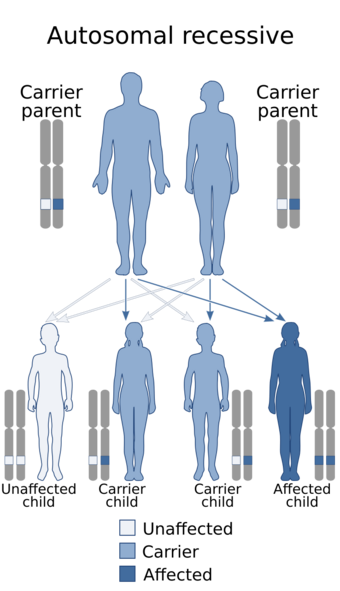Medicine:Pascual-Castroviejo syndrome
| Pascual-Castroviejo syndrome | |
|---|---|
 | |
| Autosomal recessive pattern is the inheritance manner of this condition | |
| Causes | Mutations in the TMCO1 gene |
Pascual-Castroviejo syndrome is a rare autosomal recessive condition characterized by facial dysmorphism, cognitive impairment and skeletal anomalies.
Signs/symptoms
These can be divided into four areas
- Facial features
- Brachycephaly
- Low hairline
- Narrow forehead
- Bushy eyebrows
- Synophrys
- Hypertelorism
- Ptosis
- Broad nose
- Wide philtrum
- Triangular shaped mouth
- Maxillary hypoplasia
- Cleft lip and palate
- Small conical teeth
- Short neck
- Skeletal abnormalities
- Abnormailities of the upper thoracic vertebrae and ribs
- Hypermobility
- Talipes (clubfoot)
- Central nervous system
- Hypoplasia of the corpus callosum and cerebellar vermis
- Cognitive impairment
- Chiari I malformation
- Optic nerve colobomas
- Grey matter hypodensity
- Other
Genetics
This disease is caused by mutations in the transmembrane and coiled-coil domain-containing protein 1 (TMCO1) on the long arm of chromosome 1.
Epidemiology
Pascual-Castroviejo syndrome is rare. About 20 cases have been reported worldwide.
Diagnosis
The diagnosis may be provisionally made on clinical grounds. Further diagnostic tests include serum and urine analysis for lactic acid, a chest X ray (or cardiac CT or MRI) and echocardiography. Biopsies from cardiac and skeletal muscle will show the presence of lipid and glycogen. Testing for mitochondrial abnormalities including adenosine nucleotide transporter deficiency and decreases in the respiratory chain complexes I and IV can also be done.
Differential diagnosis
This condition forms part of the spectrum of TMCO1 defects. There may be some overlap in features.
Treatment
There is no known treatment for this condition. Surgery may be helpful in treating the cleft lip and palate.
Prognosis
All cases to date have been reported in children. Long term prognosis is not known.
History
This condition was first described in 1975.[1]
References
- ↑ Pascual-Castroviejo I, Santolaya JM, Martin VL, Rodriguez-Costa T, Tendero A and Mulas F (1975) Cerebro-facio-thoracic dysplasia: Report of three cases. Dev Med Child Neurol 17:343–351
External links
| Classification |
|---|

